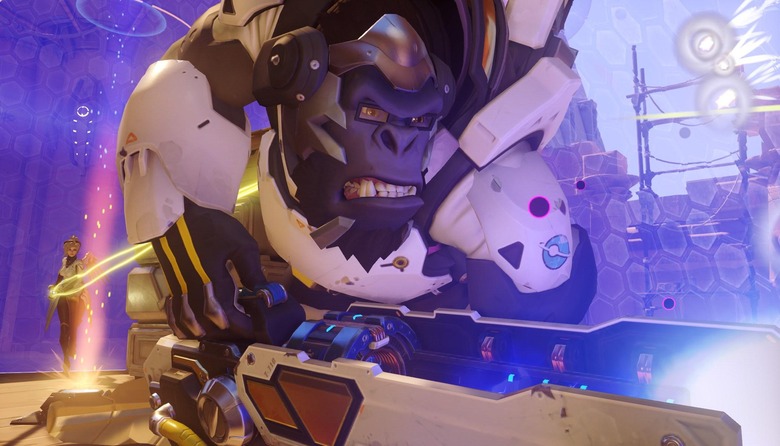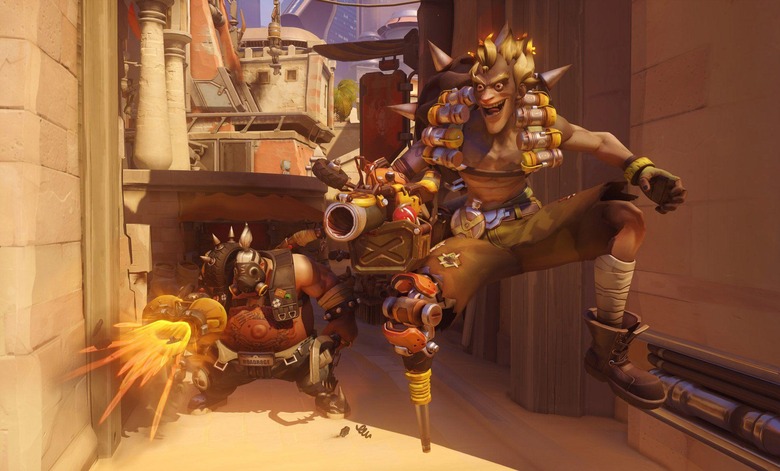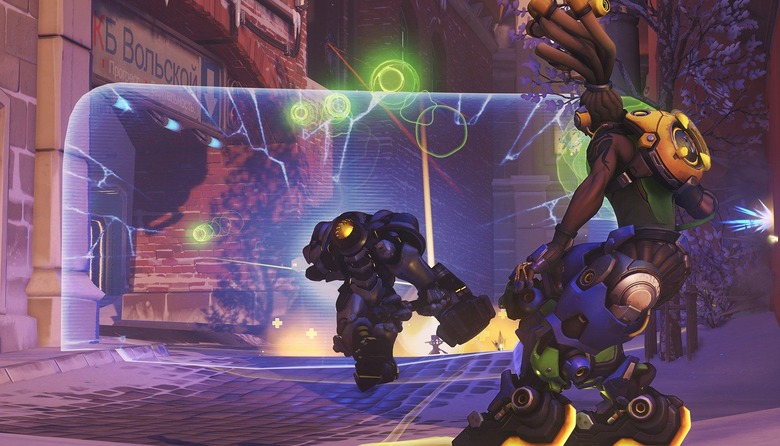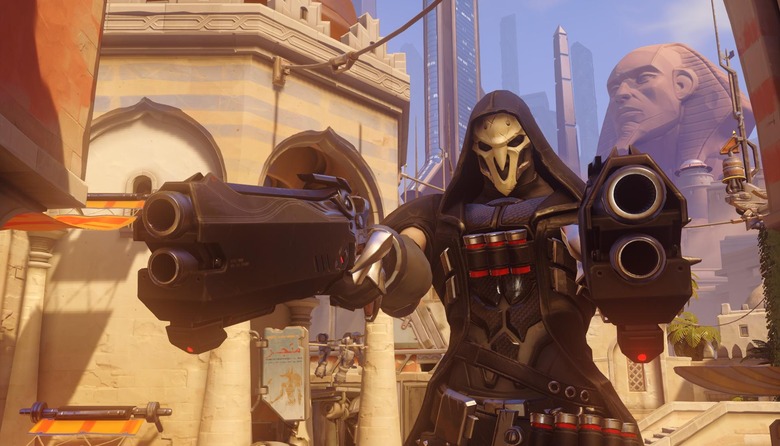The Best Games of 2016: Overwatch
We may receive a commission on purchases made from links.
It's late in the game and my team is defending the delivery point for the opposing team's payload. Things are hot around the payload, which is where I'm positioned, playing as an old, war-weary solider who's sick of fighting but nevertheless finds himself here. Bullets zoom by as I step out from behind cover, emboldened by my team's success in pushing the other team back. Then I hear it: "it's high noon," and realizing that there's no time to find cover, I accept my fate. Defeated, I decide to switch characters from the grizzled war veteran to the talking gorilla with a jet pack and a Tesla cannon, and it becomes clear that Overwatch is something special.
To be clear, Overwatch isn't special merely because one of its characters is a talking gorilla. Overwatch is special because each of its characters are unique. Not just in terms of appearance – of course the old German guy in power armor, Reinhardt, is different from the Australian dumpster diver, Junkrat, with a homemade grenade launcher. If you're looking for a diverse cast of characters, you need to look no further than Overwatch, but that much is obvious from the moment your start up the game.
No, Overwatch is special because each of its characters offer a unique playstyle. Though characters are split up into four classes – offense, defense, tank, and support – even characters within the same class are disparate entities.

For example, Solider: 76 uses an assault rifle and can lay down and area of effect healing field that allies can step into. Genji, on the other hand, is a ninja who can climb walls and deflect bullets with his sword. Both are offense heroes, so they fill the same role in team composition, but their playstyles are nowhere near similar.
Influenced by the class-based shooters like Battlefield and Team Fortress 2 that came before it, Overwatch takes the concept and pumps it full of depth. You're not just playing a class, you're playing a character with his or her (or its) own individual mechanics and abilities. The potential team compositions that arise when you're dealing with more than twenty unique heroes are near limitless.
Overwatch successfully places a heavy emphasis on teamwork, too. In a game like Call of Duty, one person might be able to go on a tear and carry his team to victory, but that's not the case in Overwatch. You not only need to make sure you have all roles covered in your team of six, but you also need to communicate and work together if you want to succeed. Unless you're playing at the a pro level, you're unlikely to see a single player turn the tide for their team.

Players will often talk of an Overwatch "meta game," but I remain convinced that a team comprised of players who are comfortable with their character choices and are dedicated to working to as one cohesive unit will almost always beat a team that's simply following the meta. The idea that it can happen at all is a testament to Blizzard's balancing efforts, but the fact that it happens so frequently is what makes Overwatch stand out in a sea of other class-based shooters.
When we get down to it, Overwatch's emphasis on teamwork is one of the main reasons it's being highlighted as one of the best games of the year. Go it alone without cooperating with your teammates and you're likely to get rolled over by the other team, unless they're similarly disorganized. Work together and you can turn a losing game into a win. When that happens – and comebacks happen often in Overwatch – it feels awesome.

The great thing about all of this is that Overwatch is getting even better as time goes on. Since launch, two new heroes have been added to the game, along with a new map. Just a few weeks back, Blizzard launched Overwatch's Arcade mode, which offers a bunch of new ways to play the game, including one-on-one mystery hero battles and three-on-three elimination matches. That's on top of two seasonal events, with a third undoubtedly coming up now that we're closing in on Christmas.
All of this extra content has been free, too. The extras Blizzard charges for are loot boxes, which contain cosmetic items like skins and victory poses. Thus far, there hasn't been any game content that can be considered essential locked away behind a paywall. Overwatch is better for it too, as it means the player base isn't segmented into groups that have none, some, or all of the add-on content.
It seems like things are only going to get better from here, as well. Even seven months after launch, finding a match is no trouble regardless of when you play (at least on PC), so Overwatch isn't likely to die anytime soon. Blizzard generally does a pretty good job of supporting games post-launch, and I'm excited to see where that approach to development goes from here.

If you've yet to play Overwatch and you're a fan of first-person shooters, you should absolutely give it a spin. The cast of characters is excellent, the graphics are colorful and vibrant – a far cry from the dark and gritty style of a lot of shooters – and the gameplay feels great. At the end of it all, Overwatch is likely a game I'll be recommending to anyone who will listen for some time to come.
Throughout the month of December, we'll be highlighting some of the best games of the year here at SlashGear. The idea is not to eventually crown one as the best of them all, but rather to really dig into what makes these games so great. Our article on Overwatch is the first one in the series, so stay tuned for the rest! If Overwatch sounds like your kind of game, you can buy it now on Xbox One, PlayStation 4, and PCSlashGear uses Amazon affiliate links, and if you buy something we may get a small share of the sale
